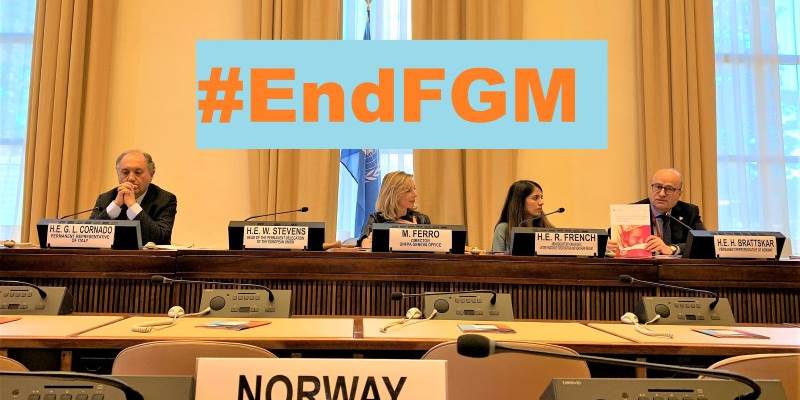Thank you to UNFPA and Monica Ferro for organising this event.
Indeed, we started this year with a very good momentum in Geneva on the work to improve the rights of the girl child and to dedicate even more resources to end the practice of FGM. We really appreciate the level of interest and positive engagement for Norway’s strategy to eliminate harmful practices.
Together with partners, we will in the years to come strengthen efforts to:
- promote full equality between men and women, and
- stand resolute in the effort to realise sexual and reproductive rights.
For this we need a room – and an entire international community – ready to join forces.
The elimination of FGM remains firmly on our agenda. We know that the harmful practice is not only an issue happening in other parts of the world. It also occurs closer to home, within our own communities.
To address this Norway has introduced a number of health & medical, legal and administrative measures. We have strengthened preventive work in schools and through voluntary engagement. We believe we can still work to better integrate the efforts against FGM in other priority areas, such as gender equality, maternal and child health, and in education.
Globally, Norway continues to support the work of organisations like UNFPA and UNICEF through the Joint Programme, as well as WHO, and national and local organisations.
Meanwhile, we know that resolutions and discussions held in various UN fora, including in the Human Rights Council, confirm the continued commitment to end FGM. We also know that the data and statistics continue to demonstrate that we still have a long way to go.
However, allow me, for a moment, to share a personal reflection:
There are many so-called “UN”- or “International Days” throughout the year to mark specific historic moments or particular challenges that we face globally. These can help to mobilise political will and resources to address a specific problem.
I believe it is extremely important to have a day dedicated to mark Zero Tolerance for FGM, and throughout my engagement on this issue, I have seen how it provides us with a powerful advocacy tool.
When this day was marked in 2013, I was serving at Norway’s Embassy in Kenya, where the challenge of FGM was, and still is, very real. Kenya has directed great efforts and made great headway, and it has been amazing to see how an issue that was initially “not-to-be” spoken about, has risen to become a challenge that is more and more openly discussed and action is taken.
In the lead up to today, a UNFPA-sponsored youth caravan has been travelling through parts of Kenya to engage with communities on the question of FGM (as part of the “Unleashing Youth Power” campaign). While this is only one example, it demonstrates concrete action, and with the excellent work of the Joint Programme, it is one of the many initiatives that gives me some hope that we are on a good track to end FGM.
We need the youth on board, we need the elderly on board. We need mothers and fathers and grandparents. We need both men and women.
And – when it comes to dedicating international efforts – I believe that, of course, every day should be a ‘Zero Tolerance for FGM’-Day!
Thank you.
Read Norway’s International Strategy to Eliminate Harmful Practices 2019–2023 here.
